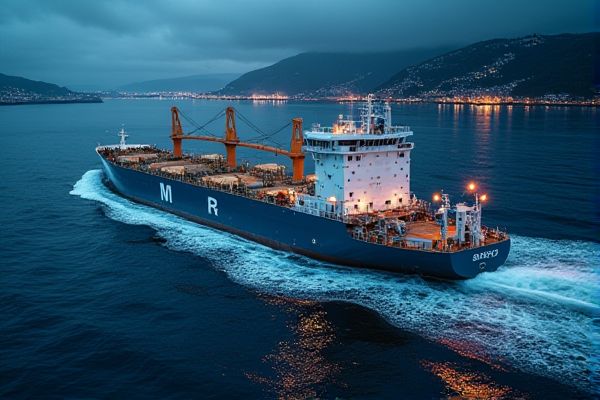
AI enhances operational efficiency in the maritime industry by optimizing route planning and fuel consumption. Predictive maintenance powered by AI algorithms helps in identifying potential equipment failures before they occur, reducing downtime and costs. Autonomous vessels are being developed, which can perform complex tasks with minimal human intervention, improving safety and reducing human error. Advanced data analytics systems aid in analyzing vast amounts of maritime data, leading to better decision-making and resource management.
AI usage in maritime industry
Autonomous Shipping
AI's integration into the maritime industry is paving the way for autonomous shipping, potentially enhancing efficiency and safety. For instance, vessels equipped with AI can optimize routes and reduce fuel consumption, lowering operational costs. Companies like Rolls-Royce are exploring these technologies, signaling a shift in traditional shipping methods. This advancement presents a chance for reduced human error and improved navigation under various conditions.
Predictive Maintenance
Predictive maintenance in the maritime industry can enhance operational efficiency by forecasting equipment failures before they occur. By utilizing AI algorithms, companies like Rolls-Royce can analyze sensor data from vessels to optimize maintenance schedules. This approach minimizes unexpected downtime and reduces repair costs, creating potential savings. Implementing such technology may also lead to improved safety and compliance with environmental regulations.
Route Optimization
AI systems can significantly improve route optimization in the maritime industry by analyzing vast amounts of data from various sources. By predicting weather patterns, traffic conditions, and fuel consumption, companies like Maersk can enhance operational efficiency. This technology offers the potential to reduce transit times and operational costs, ultimately leading to increased profitability. Implementing AI-driven solutions may provide a competitive edge, allowing maritime firms to adapt swiftly to changing circumstances.
Fuel Consumption Reduction
AI technology in the maritime industry presents a significant opportunity for fuel consumption reduction. By optimizing routing and engine performance, companies can enhance operational efficiency, potentially leading to cost savings. For example, a shipping company like Maersk could leverage AI analytics to minimize fuel usage on its vessels. The application of machine learning algorithms may result in more accurate predictions of fuel needs, enabling better resource management.
Cargo Management Systems
AI can enhance Cargo Management Systems by optimizing loading patterns and reducing turnaround times. By analyzing shipping data, AI can predict delays and suggest alternatives, contributing to more efficient operations. Companies like IBM have developed AI tools that can assist maritime logistics, showcasing potential benefits. The chance for cost reduction and improved fleet utilization makes AI integration appealing for industry stakeholders.
Environmental Monitoring
AI technologies in the maritime industry can enhance environmental monitoring by providing real-time data analysis and predictive insights. For example, a shipping company could use AI to track emissions and optimize fuel consumption, resulting in reduced environmental impact. The use of machine learning algorithms allows for the detection of anomalies in oceanographic conditions, potentially aiding in marine conservation efforts. By integrating AI with existing monitoring systems, organizations can improve compliance with environmental regulations and promote sustainability.
Safety and Risk Management
AI can enhance safety and risk management in the maritime industry by predicting maintenance needs for vessels, potentially reducing accidents. For example, integrating AI-driven algorithms can analyze data from sensors on ships, leading to timely interventions before mechanical failures occur. Predictive analytics also allows companies to assess risks more accurately, improving decision-making processes for navigational safety. This technology holds the promise of streamlining operations while potentially lowering insurance costs for shipping firms.
Crew Assistance Tools
AI usage in the maritime industry has the potential to enhance crew efficiency and safety through advanced Crew Assistance Tools. These tools can analyze real-time data from navigation systems and environmental conditions to provide actionable insights. For example, institutions like the International Maritime Organization are exploring AI solutions to optimize vessel operations. The incorporation of AI could lead to significant reductions in operational costs and improved decision-making under challenging conditions.
Port Operations Efficiency
AI has the potential to significantly enhance port operations efficiency by optimizing resource allocation and streamlining logistics processes. For example, predictive analytics can be employed to forecast shipping traffic and adjust berth schedules accordingly. Implementing AI-driven systems may lead to reduced turnaround times for vessels, enabling ports like the Port of Rotterdam to handle increased cargo volumes. The prospect of minimizing operational costs through automation and improved decision-making presents a substantial advantage for stakeholders in the maritime industry.
Real-time Weather Analytics
AI usage in the maritime industry can enhance real-time weather analytics, allowing for safer navigation and operational efficiency. By predicting weather patterns, vessel operators can optimize routes, reducing fuel consumption and time at sea. This capability may particularly benefit shipping companies such as Maersk, where timely data can minimize delays and operational costs. The integration of AI in weather forecasting presents a substantial opportunity for improved decision-making in maritime logistics.
 techknowy.com
techknowy.com